Exclusive look at what it's really like inside Preston's Intensive Care Unit as Covid cases spike
and live on Freeview channel 276
A senior doctor leading the fight against Covid-19 at Royal Preston Hospital has issued a stark warning about the realities of the virus.
Dr Dan Cottle has spoken exclusively to the Post to highlight the enormous challenges heroic medics are facing - and to beg the public to take coronavirus seriously.
Advertisement
Hide AdAdvertisement
Hide AdDr Cottle, Clinical Director and Consultant in Anaesthesia and Critical Care, said he had been bowled over by the efforts of NHS staff 'going above and beyond' to deal with large numbers of seriously ill patients.
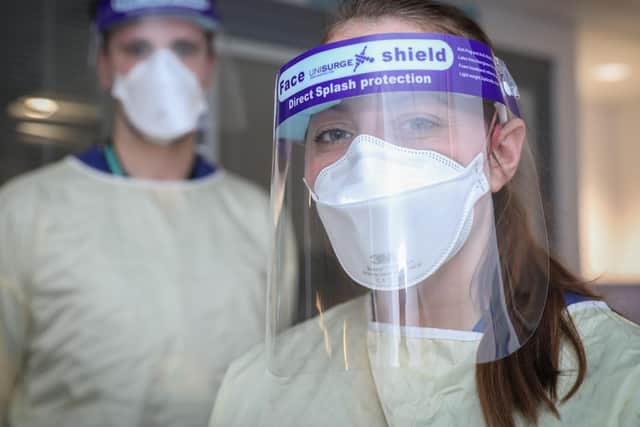

He said other units such as maternity and the emergency department were still "open for business" and people should feel reassured that they are safe and Covid-secure.
He stressed we can all play a part by following the guidelines to help prevent the spread of the virus.
He said: "We've had families who've lost brothers and both parents. We had three siblings on the unit two weeks ago, so you do run the risk if your family has poor health and you'e got Covid. You know, you could lose your whole family there, couldn't you?"
Advertisement
Hide AdAdvertisement
Hide AdThe hospital has increased the number of beds in it's Intensive Care Unit (ICU) from 28 to 47, and in order to cope, non-specialist nurses have been brought in from other clinics and outpatient services to help treat the hospital's sickest patients.
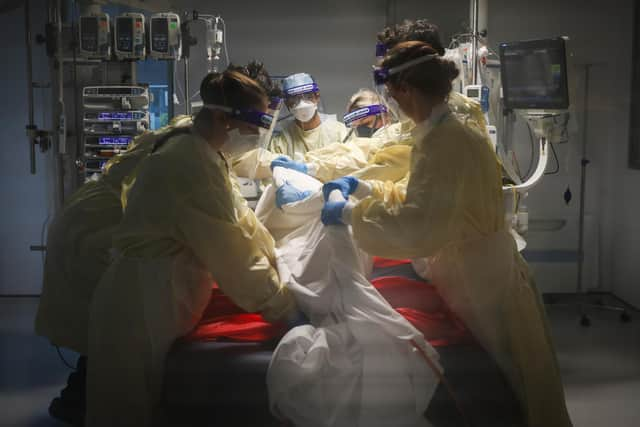

Dr Cottle said half of the unit was usually filled with Covid patients, but in the last week it's "tipped into becoming the majority", with 32 to 34 currently with the virus, and the number relying on ventilators to breathe "in the high 20s".
"The challenges are huge", he said, and the pressures are being felt physically and emotionally by the staff.
"It's a common sight to see staff crying on the unit now. That is a daily event, which was never seen before really", he said.
Advertisement
Hide AdAdvertisement
Hide Ad"Some of it is because of specific situations, and sometimes it's feeling overwhelmed. We are having to push staff to go above and beyond."
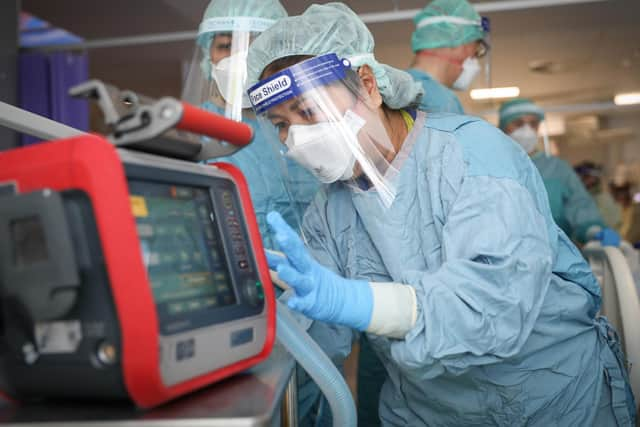

He added: "Traditionally a person in a bed with a ventilator requires one-to-one nursing and traditionally that would always be with an ICU nurse.
"But clearly with nearly doubling the beds, we've had to redeploy non-specialist nurses into the Intensive Care and that's had a massive implication for those nurses redeployed and for our nurses as well.
"So if you think, a lot of these nurses who've been redeployed have come from places like outpatients, the education centre, some specialist clinics, so they've gone from working in environments like clinics to suddenly finding themselves on nightshifts on an Intensive Care that is twice as big as it use to be, managing the sort of patients it's never managed, and that has a massive impact on these nurses.
Advertisement
Hide AdAdvertisement
Hide Ad"I think it's incredible the way they've stepped up, it it is a big ask of them and it's a big ask of our own ICU nurses.
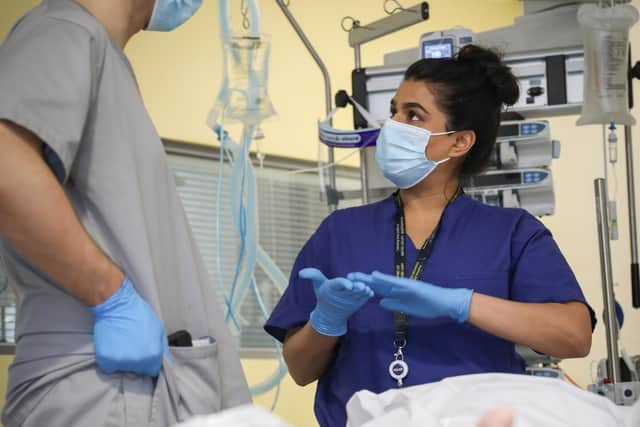

"They now work on a one-to-two or a one-to-four ratio with patients, so half what they would normally do and they support these members of staff."
>>>Click here to read about a patient's experience of being in ICU at RPH
Dr Cottle said huge manpower is needed to treat the hospital's sickest patients around the clock.
Advertisement
Hide AdAdvertisement
Hide AdHe said: "An ICU patient, most, or at least half of them now are under anaesthetic, on a ventilator. So that ventilator needs managing 24 hours a day.
"Ventiliating a patient with Covid, ventilating their lungs is incredibly difficult. It needs constant readjusting and frequently patients with Covid require being proned, which is where they get led on their front. It improves the distribution of oxygen and blood flow in their lungs.
"To move someone on their front once they're on a ventilator is really difficult, actually.
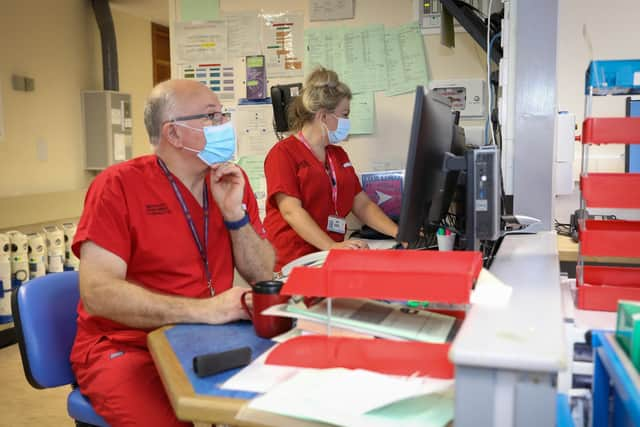

"Most of these patients are heavily overweight and once you have a tube in your mouth, your head has to be positioned in a way so that tube doesn't do any damage.
Advertisement
Hide AdAdvertisement
Hide Ad"All of the monitoring tubes sit on the front of the patient, the lines, the IV access, someone might be having dialysis, so another large drip is going into their neck or the top of their leg, so all these things need moving around.
"So actually, to get someone on their front takes five to six people about 40 minutes. If you've got 10 people doing that on a shift and they need to go on their front once a day and they can only stay there for 18 hours, that's a large implication."
Dr Cottle said that some staff members are also struggling with the Personal Protective Equipment (PPE) they have to wear, with suits and masks causing headaches and dehydration.
He also said communication while wearing masks was a big issue, with staff not able to see facial expressions, and background noise from monitors and oxygen masks making it hard for patients to speak with nurses and also their families over video calls.
Advertisement
Hide AdAdvertisement
Hide AdWhile visiting is still banned, families are now allowed to see their relatives in the final hours of life, which is a blessing to a lot of people, but can also be shocking.
Dr Cottle said: "So they (the patient) might have been in Intensive Care for several weeks and yet the families might only see them on the last day, and it makes it difficult for the families to understand and process just how sick their relative has become since they've got into hospital. It can be difficult communicating some of these things on the phone."
He added: "It's difficult for staff and families. When you start to have discussions about when someone's probably going to die and how that might happen, it's very difficult to do on the phone. You're only chatting to one person, it's quite difficult to read how they're understanding the information you're giving to them."
Dr Cottle said ICU staff have discussions with people early enough about their prognosis, so they can have time to process it and explain to their families.
Advertisement
Hide AdAdvertisement
Hide AdHe said: "Sometimes (the timeframe) is incredibly short, so recently we had a young guy come onto the unit and we essentially had to get him to phone his wife there and then because we thought he would go onto the ventilator in the next hour or so, and it was a 50/50 chance of coming off."
Explaining how he talks to people who may not survive, he said: "Obviously it's awful news, but you have to provide them with some reassurance that if they get worse and start to die, that they'll be comfortable and we'll manage that with dignity."
If a person with Covid becomes so ill they need to be hospitalised, that usually comes around 10 days into their illness, and people who require Intensive Care usually go there 12 days into their illness. They typically stay 10 days, but recently discharged one man was discharged after 56 days in ICU.
The more intervention a patient requires, the higher the chance of dying.
Advertisement
Hide AdAdvertisement
Hide AdA patient in their 70s who gets so ill they require a ventilator to breathe, their chance of dying is 70 per cent, and that increases as you get older.
Dr Cottle said the age range his team are seeing are predominantly in their 60s and 70s, but they have seen some people in their 40s dying.
He is keen to stress the knock-on effects of the public not treating Covid seriously affect many more people than get sick with the virus.
He said: "It's not just caring for an increase in Covid patients, but a knock-on effect on other patient groups, so, operations start to be delayed, sometimes up to a year.
Advertisement
Hide AdAdvertisement
Hide Ad"In the grand scheme of things, it's actually a small proportion of patients who come to Intensive Care, and yet we are still threatening to overcome the service"
Speaking about conspiracy theories and claims of a hoax, he said: "It definitely is real. We used to have a nice unit that ran well in a hospital that was functional, with staff who enjoyed their jobs. It's hard to think why anybody would reverse that and go to a huge amount of effect to create a hoax or somehow fake an illness.
"The staff in the hospital are feeling the effects of lockdown the same as everyone else. Everyone wants to go home and see their friends and family."
Dr Cottle said there was a "huge burden" on physiotherapy and psychology departments due to the aftermath of the pandemic for both staff and patients.
Advertisement
Hide AdAdvertisement
Hide AdBut, he was also keen to stress that lessons have been learned since the pandemic began, including expediting the completion of the new, state of the art ICU and have been caring for patients in there, opening a new respiratory high care ward that can care for patients with chronic lung disease requiring non-invasive ventilation, as well as Covid, and opening a new rehabilitation step down unit to help patients get home and relieve the pressure on the wards.
The hospital has also been heavily involved in research projects on Covid, and has managed to detect many cases early on by increased testing of all staff twice a week.
In other departments, hospital bosses say it's "business as usual".
Maternity Services
A spokesman said: "Lancashire Teaching Hospitals’ Maternity services continue to go from strength to strength with the opening of the new Birth Centre at Chorley and despite the necessary mitigations that have been put in place to keep families and their babies safe from the risk of infection, families can still benefit from an extremely positive experience in state of the art facilities and can take home treasured memories of their babies precious first hours and days."
Emergency Department
Advertisement
Hide AdAdvertisement
Hide AdThe spokesman added: "It is very important that the local community are aware that the NHS continues to be very much open for business.
"The Trust’s Accident and Emergency Departments at both Chorley & South Ribble (adults only) and Royal Preston Hospitals continue to treat patients needing emergency care and at Royal Preston this includes care of patients with serious conditions such as stroke and heart failure as well as the treatment of paediatrics and those with Covid-19. The Trust’s major trauma centre also continues to save lives across the region every day of the week."
Comment Guidelines
National World encourages reader discussion on our stories. User feedback, insights and back-and-forth exchanges add a rich layer of context to reporting. Please review our Community Guidelines before commenting.